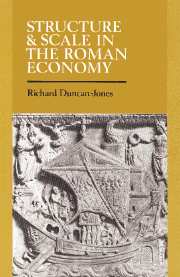Book contents
- Frontmatter
- Contents
- List of figures
- List of tables
- Preface
- List of abbreviations
- Introduction
- PART I TIME AND DISTANCE
- PART II DEMOGRAPHY AND MANPOWER
- PART III AGRARIAN PATTERNS
- PART IV THE WORLD OF CITIES
- PART V TAX-PAYMENT AND TAX-ASSESSMENT
- 12 Taxation in money and taxation in kind
- 13 Land, taxes and labour: implications of the iugum
- Appendices
- Bibliography
- Index
13 - Land, taxes and labour: implications of the iugum
Published online by Cambridge University Press: 13 October 2009
- Frontmatter
- Contents
- List of figures
- List of tables
- Preface
- List of abbreviations
- Introduction
- PART I TIME AND DISTANCE
- PART II DEMOGRAPHY AND MANPOWER
- PART III AGRARIAN PATTERNS
- PART IV THE WORLD OF CITIES
- PART V TAX-PAYMENT AND TAX-ASSESSMENT
- 12 Taxation in money and taxation in kind
- 13 Land, taxes and labour: implications of the iugum
- Appendices
- Bibliography
- Index
Summary
Introduction
As seen in the previous chapter, our knowledge of the tax-system of the Principate is very indistinct. Tax inscriptions are very few, and surviving legal sources, almost all selected at a much later date, throw very little light on taxation in this period. With the late Empire, the position changes. Legal texts bearing on taxation become relatively abundant, and a series of detailed census inscriptions survives, together with some relevant literary evidence.
This extreme imbalance between what is known at different dates greatly restricts comparisons. It seems obvious in itself that important features of the Diocletianic tax-system, if not explicitly encountered in earlier sources, should represent innovations. But there are almost no detailed general descriptions of what preceded it. Where evidence will allow, it is worth trying to assess how new Diocletian's system was. The present chapter examines the main Diocletianic land tax-unit, and its implications both for the tax-system, and for the level of agriculture manpower.
Our knowledge of land-taxation of course remains very imperfect even in the late Empire. It is limited both by the increasing insistence of imperial draftsmen on literary elegance at the expense of exactness (adding to the problems of terminology in literary sources of the Principate seen in the previous chapter), and by the fact that isolated fragments of information are spread over a long period. Though the constitutions are dated, they are generally too few to allow effective inferences about long-term change.
- Type
- Chapter
- Information
- Structure and Scale in the Roman Economy , pp. 199 - 210Publisher: Cambridge University PressPrint publication year: 1990



